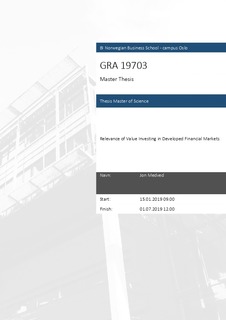Relevance of Value Investing in Developed Financial Markets
Master thesis
Permanent lenke
http://hdl.handle.net/11250/2622596Utgivelsesdato
2019Metadata
Vis full innførselSamlinger
- Master of Science [1621]
Sammendrag
This paper researches if Value Investing is an efficient approach as an
investment management framework. The focus is on the large market
capitalization stock market in the United States. The tested period is from the
beginning of 2007 until the beginning of 2019. 6 portfolios based on the
fundamental analysis were created and tested with the holding period of 5 years.
The theory is based on the Efficient Market Hypothesis (EMH), Modern Portfolio
Theory (MPT), and on the Value Investing Theory, which is one of the
fundamental analysis techniques. According to the findings, it is impossible to
accept the EMH, and the findings steer towards the Value Investing as being an
approach with a potential to deliver positive Alpha. Furthermore, a distinction
between Value Stocks and Value Investing is made, as often those two terms are
used interchangeably. The performance analysis of Berkshire Hathaway steers
towards the finding that it is much harder to deliver superior results based on the
Value Investing approach when the investing is done on a very large scale, as in
the 1980 class A stock price was less than 300 USD, in 1990 roughly 7.000 USD
and in the beginning of 2019 311.000 USD (the numbers are comparable, since
the class A stock was never split). Furthermore, the market capitalization in 2018
it exceeded 500 billion dollars. Economically and statistically significant
diminishing Jensen’s Alpha suggests that the superior returns could be inversely
related to the market size.
Beskrivelse
Masteroppgave(MSc) in Master of Science in Business, Finance - Handelshøyskolen BI, 2019
